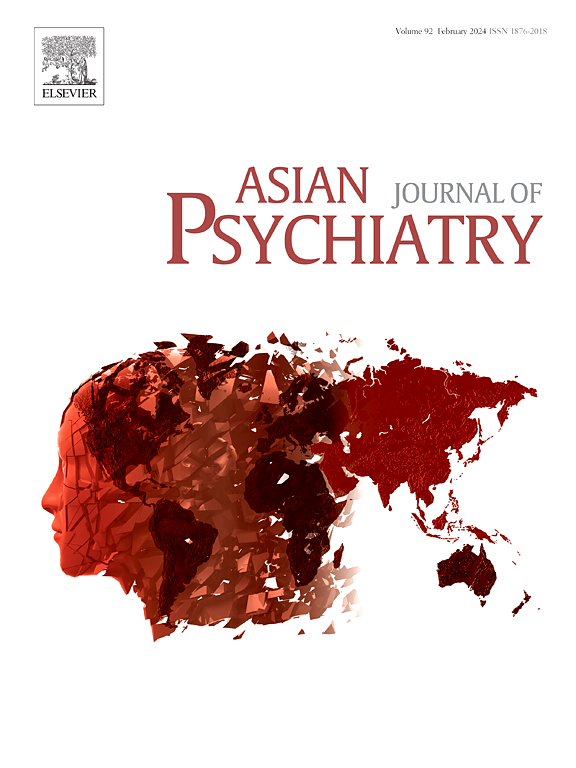Feasibility and preliminary findings of the digital self-management program for people with schizophrenia in Indonesia
IF 3.8
4区 医学
Q1 PSYCHIATRY
引用次数: 0
Abstract
Background
Individuals with schizophrenia often experience self-management challenges due to the symptoms and mental health problems that impact the recovery process. Currently, digital interventions have shown potential effectiveness for people with schizophrenia in low- and middle-income countries. However, no such studies have been undertaken in Indonesia. We developed HOPE4Schizophrenia, a 6-week co-created digital self-management program. This study aimed to examine the feasibility of HOPE4Schizophrenia for people with schizophrenia.
Methods
A total of 35 participants enrolled in the intervention. The primary outcomes were to investigate recruitment rates, adherence rates, engagement rates, progression criteria, and participants’ satisfaction with the intervention. The secondary outcomes measured hope, recovery, and mental well-being at pre-, post-, and 3-month follow-up.
Results
The results showed that the recruitment, adherence, and engagement rates were high (50.7 %, 79 %, and 85 %, respectively). All the predetermined progression criteria were met. Most participants (90 %) reported that they found the course useful. There was a significant difference in recovery between pre-course and post-course and follow-up (F(2, 48) = 4.997, p = 0.011). There were no significant differences in hope and mental well-being at the three time points.
Conclusions
All progression criteria for a definitive trial were met, as supported by high recruitment, adherence, and engagement rates. While this study was not powered to detect effectiveness, preliminary findings indicated that HOPE4schizophrenia has the potential to support recovery in individuals with schizophrenia. This study presents a novel and promising finding for HOPE4schizophrenia. A future trial is needed to test the clinical effectiveness of this intervention.
印度尼西亚精神分裂症患者数字化自我管理项目的可行性和初步结果
精神分裂症患者由于症状和影响康复过程的心理健康问题,往往会遇到自我管理方面的挑战。目前,数字干预措施已显示出对低收入和中等收入国家精神分裂症患者的潜在有效性。但是,印度尼西亚没有进行这种研究。我们开发了HOPE4Schizophrenia,这是一个为期六周的数字自我管理项目。本研究旨在检验HOPE4Schizophrenia对精神分裂症患者的可行性。方法本研究共纳入35例受试者。主要结果是调查招募率、依从率、参与率、进展标准和参与者对干预的满意度。次要结果在随访前、后和3个月时测量希望、恢复和心理健康。结果招募率、依从率和参与率均较高(分别为50.7 %、79 %和85 %)。所有预定的进展标准均得到满足。大多数参与者(90% %)报告说他们发现课程很有用。治疗前、治疗后及随访患者的恢复情况差异有统计学意义(F(2,48) = 4.997,p = 0.011)。在三个时间点上,希望和心理健康没有显著差异。结论:高招募率、依从性和参与率支持了最终试验的所有进展标准。虽然这项研究没有检测有效性,但初步结果表明,HOPE4schizophrenia具有支持精神分裂症患者康复的潜力。这项研究为HOPE4schizophrenia提供了一个新颖而有希望的发现。未来的试验需要测试这种干预的临床有效性。
本文章由计算机程序翻译,如有差异,请以英文原文为准。
求助全文
约1分钟内获得全文
求助全文
来源期刊

Asian journal of psychiatry
Medicine-Psychiatry and Mental Health
CiteScore
12.70
自引率
5.30%
发文量
297
审稿时长
35 days
期刊介绍:
The Asian Journal of Psychiatry serves as a comprehensive resource for psychiatrists, mental health clinicians, neurologists, physicians, mental health students, and policymakers. Its goal is to facilitate the exchange of research findings and clinical practices between Asia and the global community. The journal focuses on psychiatric research relevant to Asia, covering preclinical, clinical, service system, and policy development topics. It also highlights the socio-cultural diversity of the region in relation to mental health.
 求助内容:
求助内容: 应助结果提醒方式:
应助结果提醒方式:


